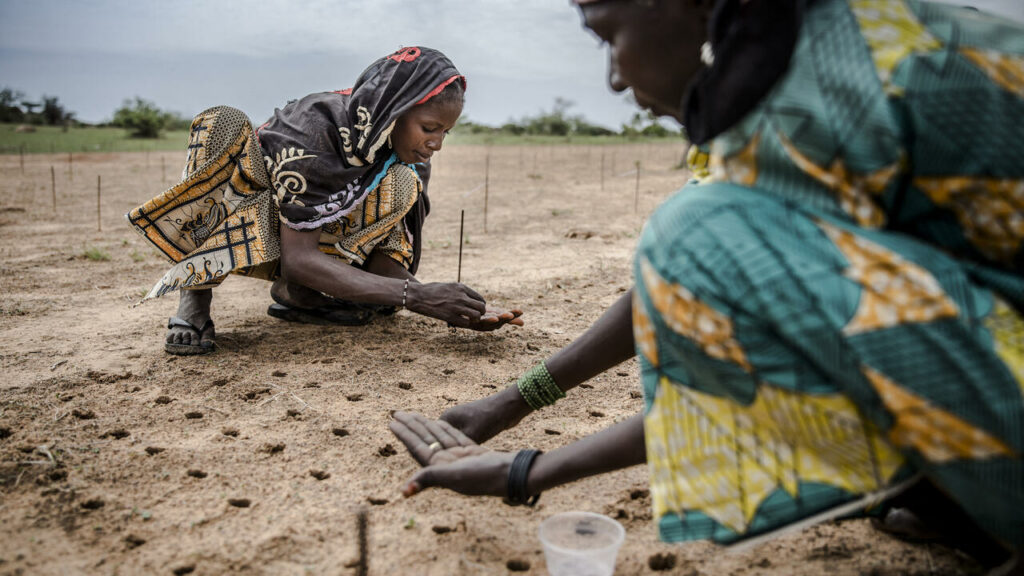Published on :
Negotiators from 196 countries are meeting until May 20 in the Ivorian capital for COP 15. This UN conference devoted to desertification must set ambitious objectives in the fight against land degradation, a scourge that primarily affects the African continent.
It is less known than its big sisters dedicated to climate and biodiversity, but it is no less decisive at a time when the UN estimates that 40% of the land is degraded in the world. The 15th Conference of the Parties (COP) of the United Nations Convention to Combat Desertification (UNCCD), is being held in Abidjan, Côte d’Ivoire, until May 20.
This is the first time that an African country has hosted this conference, a strong symbol for the continent, on the front line in the face of this ecological disaster. Questioned by RFI, the Ivorian Minister of the Environment, Jean-Luc Assi, recalls that “319 million hectares in Africa are threatened by desertification”.
Far from being limited to the advance of the desert, desertification is a complex process linked to global warming and human activities. “It is a phenomenon that is difficult to measure precisely and in which climatic variations and anthropogenic causes linked to land use, mainly agriculture and livestock, come into play”, explains Agnès Bégué, researcher at the Cooperation Center organization in agricultural research for development (CIRAD).
Depletion of water resources, land degradation, deforestation, intensive agriculture is, in fact, often singled out for its role in accelerating desertification. As such, Côte d’Ivoire, and its cocoa cultivation, is primarily concerned: since 1900, its forest area has decreased by 80%, from 16 million hectares to 2.9 million in 2021.
>> Ivory Coast: cocoa cultivation threatened by deforestation
« At the current rate, our forest could disappear completely by 2050 », warned the Ivorian head of state, Alassane Ouattara, at the opening of the conference to which 5,000 actors from civil society, entrepreneurs and even scientists must participate.
Take care of the earth and people
For African countries, the consequences of desertification and soil degradation are as numerous as they are disastrous: sandstorms, drought, food insecurity, migration, poverty…
In a note on the costs and socio-economic consequences of desertification, researcher Mélanie Requier-Desjardins assures that poverty even tends to increase the process in a vicious circle fueled by the « lack of capital and economic opportunities ». that lead poor people to « overexploit their limited resources to meet pressing needs ».
This new COP should therefore reaffirm the need to reorient agriculture towards more sustainable practices by involving rural populations living in arid zones. Because, if agriculture is partly the cause of the problem, it can also be a source of solutions “provided that agro-ecological principles are adopted” underline, in a press release, the CIRAD scientists present in Abidjan.
“It’s territorial management which consists of trying to find the best compromise between preserving natural vegetation and providing food for all”, sums up researcher Agnès Bégué.
According to a report published ahead of COP 15, the international community is banking on restoring one billion hectares of degraded land by 2030.
The “Great Green Wall” in question
For its part, Côte d’Ivoire presented the “Abidjan Initiative”, a five-year program with a budget of 1.5 billion dollars to restore “degraded forest ecosystems” and promote “approaches sustainable soil management”.
The African Development Bank and the European Union are among the main donors. These include restoring 20% of Ivorian forest cover by the end of the decade.
This COP will also be an opportunity to examine the progress of the “Great Green Wall”, an emblematic pan-African project to combat desertification which is to extend over 8,000 km, from Senegal to Ethiopia.
>> To see: a fragile green wall in Africa
Initiated about fifteen years ago, this wall of vegetation is actually closer to a mosaic of environmentally friendly agricultural projects, intended to provide sustainable jobs to local populations.
Since its launch, the project has made it possible to restore nearly 20 million hectares of degraded land in the Sahel zone and to create 350,000 jobs, assures the French Development Agency.
But despite international mobilization and new funding announced at the fourth edition of the One Planet Summit in 2021, this pharaonic project is struggling to get off the ground. Today, the UN estimates that barely 4% of the target set for 2030 has been achieved, ie 4 million hectares of developed land out of the 100 million in the programme.
With AFP
.

